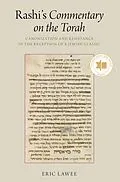Winner of the Jewish Book Council Nahum M. Sarna Memorial Award in Scholarship This book explores the reception history of the most important Jewish Bible commentary ever composed, the Commentary on the Torah of Rashi (Shlomo Yitzhaki; 1040-1105). Though the Commentary has benefited from enormous scholarly attention, analysis of diverse reactions to it has been surprisingly scant. Viewing its path to preeminence through a diverse array of religious, intellectual, literary, and sociocultural lenses, Eric Lawee focuses on processes of the Commentary's canonization and on a hitherto unexamined--and wholly unexpected--feature of its reception: critical, and at times astonishingly harsh, resistance to it. Lawee shows how and why, despite such resistance, Rashi's interpretation of the Torah became an exegetical classic, a staple in the curriculum, a source of shared religious vocabulary for Jews across time and place, and a foundational text that shaped the Jewish nation's collective identity. The book takes as its larger integrating perspective processes of canonicity as they shape how traditions flourish, disintegrate, or evolve. Rashi's scriptural magnum opus, the foremost work of Franco-German (Ashkenazic) biblical scholarship, faced stiff competition for canonical supremacy in the form of rationalist reconfigurations of Judaism as they developed in Mediterranean seats of learning. It nevertheless emerged triumphant in an intense battle for Judaism's future that unfolded in late medieval and early modern times. Investigation of the reception of the Commentary throws light on issues in Jewish scholarship and spirituality that continue to stir reflection, and even passionate debate, in the Jewish world today.
Autorentext
Eric Lawee is Professor of Bible at Bar-Ilan University where he specializes in Jewish biblical interpretation in medieval and modern times. He holds the Weiser Chair for Research into Medieval Jewish Biblical Interpretation and directs Bar-Ilan's Institute for Jewish Bible Interpretation. He recently served as Shoshana Shier Distinguished Visiting Professor for Jewish Studies at the University of Toronto. His studies appear in leading journals of Jewish studies, religious studies, and medieval studies. His first book, Isaac Abarbanel's Stance Toward Tradition: Defense, Dissent, and Dialogue (2001), won a Canadian Jewish Book Award and was a finalist for a National Jewish Book Award.
Klappentext
This book explores the reception history of the most important Jewish Bible commentary ever composed, the Commentary on the Torah of Rashi (Shlomo Yitzhaki; 1040-1105). Though the Commentary has benefited from enormous scholarly attention, analysis of diverse reactions to it has been surprisingly scant. Viewing its path to preeminence through a diverse array of religious, intellectual, literary, and sociocultural lenses, Eric Lawee focuses on processes of the Commentary's canonization and on a hitherto unexamined--and wholly unexpected--feature of its reception: critical, and at times astonishingly harsh, resistance to it. Lawee shows how and why, despite such resistance, Rashi's interpretation of the Torah became an exegetical classic, a staple in the curriculum, a source of shared religious vocabulary for Jews across time and place, and a foundational text that shaped the Jewish nation's collective identity. The book takes as its larger integrating perspective processes of canonicity as they shape how traditions flourish, disintegrate, or evolve. Rashi's scriptural magnum opus, the foremost work of Franco-German (Ashkenazic) biblical scholarship, faced stiff competition for canonical supremacy in the form of rationalist reconfigurations of Judaism as they developed in Mediterranean seats of learning. It nevertheless emerged triumphant in an intense battle for Judaism's future that unfolded in late medieval and early modern times. Investigation of the reception of the Commentary throws light on issues in Jewish scholarship and spirituality that continue to stir reflection, and even passionate debate, in the Jewish world today.
Zusammenfassung
Winner of the Jewish Book Council Nahum M. Sarna Memorial Award in ScholarshipThis book explores the reception history of the most important Jewish Bible commentary ever composed, the Commentary on the Torah of Rashi (Shlomo Yitzhaki; 1040-1105). Though the Commentary has benefited from enormous scholarly attention, analysis of diverse reactions to it has been surprisingly scant. Viewing its path to preeminence through a diverse array of religious, intellectual, literary, and sociocultural lenses, Eric Lawee focuses on processes of the Commentary's canonization and on a hitherto unexamined--and wholly unexpected--feature of its reception: critical, and at times astonishingly harsh, resistance to it. Lawee shows how and why, despite such resistance, Rashi's interpretation of the Torah became an exegetical classic, a staple in the curriculum, a source of shared religious vocabulary for Jews across time and place, and a foundational text that shaped the Jewish nation's collective identity. The book takes as its larger integrating perspective processes of canonicity as they shape how traditions flourish, disintegrate, or evolve. Rashi's scriptural magnum opus, the foremost work of Franco-German (Ashkenazic) biblical scholarship, faced stiff competition for canonical supremacy in the form of rationalist reconfigurations of Judaism as they developed in Mediterranean seats of learning. It nevertheless emerged triumphant in an intense battle for Judaism's future that unfolded in late medieval and early modern times. Investigation of the reception of the Commentary throws light on issues in Jewish scholarship and spirituality that continue to stir reflection, and even passionate debate, in the Jewish world today.
Inhalt
Acknowledgements Notes on Translations and Editions Introduction: Rashi's Commentary on the Torah: Canonical and Classic Part 1. Toward Canonicity Chapter 1. Conundrums of the Commentary: Contours of a Classic Chapter 2. Rashi's Commentary: Receptions, 1105-1527 Chapter 3. Interpreting the Interpreter: Supercommentarial Receptions in Ashkenaz and Sefarad Part 2. Resisting Readers Chapter 4. "Ridiculousness and Risibility": Rationalist Criticism in an Eastern Mediterranean Key Chapter 5. Rationalism Versus the Rashi/Rabbinic Axis: Pseudo-Rabad's Book of Strictures Chapter 6. Aaron Aboulrabi and "The Straight One": Between "Girls' Fantasies" and "Sweet Midrash" Part 3 Commentary Triumphant Chapter 7. Competing Canons: Rashi's Commentary in a Late Medieval Battle for Judaism's Soul Afterword: Rashi's Commentary on the Torah in Modern Times Notes Bibliography Index
